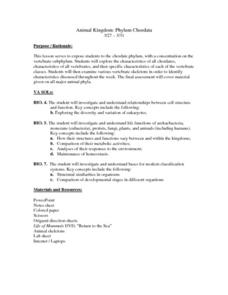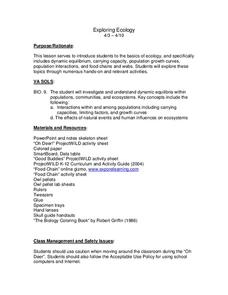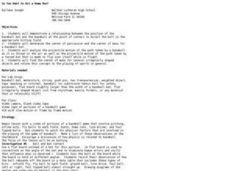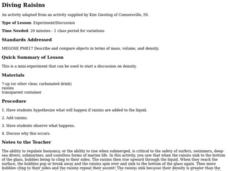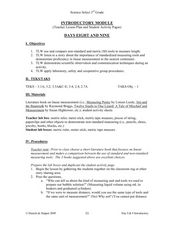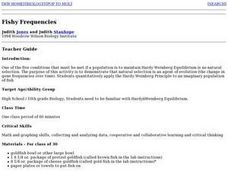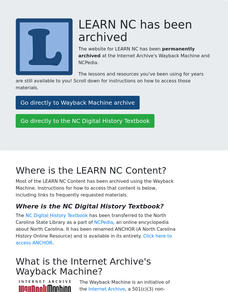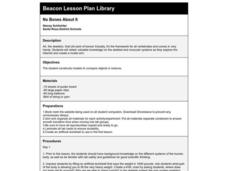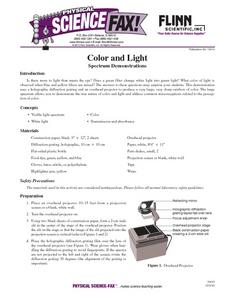Curated OER
Determining Liquid Densities
Students practice determining liquid densities in a short, hands-on lab activity. Students use a graduated cylinder to measure out 100 milliliters of a liquid, find its mass using a balance, and record measurements in a data table....
Curated OER
What Is Electricity
Fourth graders develop an understanding of static electricity and discover how to detect a charge by using electroscopes. For this electricity lesson, 4th graders complete a lab on electricity and discuss the results with the class.
Curated OER
Franklin Mountains
Students review the steps of the rock cycle. In groups, they identify the natural forces that cause weathering and erosion. They describe how sedimentary, metamorphic and igneous rocks might be formed in nature to end the lesson.
Curated OER
Animal Kingdom: Phylum Chordata
Students use a dichotomous key to classify various vertebrate jar speciments into classes. They examine the speciments for general characteristics of each class and fill in a corresponding chart and then complete a few final assessment...
Curated OER
Exploring Ecology
Young scholars explore the basics of ecology through numerous hands-on and relevant activities. They participate in an online food chain demonstration, which explores food web dynamics. They dissect owl pellets, examine the prey's...
Curated OER
Water Hardness- Causes and Testing
Eighth graders examine what materials cause water hardness and the relative measure of water hardness in a two part lab activity. In part one, 8th graders add an assigned soap test solution to eleven different test tube solutions in...
Curated OER
Create Your Own Cloud
Students explore and analyze weather conditions, climates, compositions and characteristics of the atmosphere and weather patterns. They explain in detail the water cycle and its relationship to weather patterns. A lab experiment is...
Curated OER
So You Want to Hit a Home Run?
Students determine the center of percussion and the center of mass for a baseball bat. In this projective motion lesson students demonstrate the relationship between the position of the baseball bat and when its in the position in the...
Curated OER
Diving Raisins
Young scholars participate in a mini lab to explore density. For this density lesson students view a demonstration and answer questions.
Curated OER
The Perils of Drinking Water
Students determine the presence of drugs in water. In this chemistry lesson, students experiment on water samples using thin layer and column chromatography. They determine the concentration of drugs present using graphical analysis.
Curated OER
Smelly Balloons
Students investigate the concept of diffusion through a membrane. They do this through the conduction of a simple experiment. Students make observations while determining if the smell of different chemicals seeps through the balloon...
Curated OER
Introductory Module
Third graders examine the non-standard method of measurement and compare it to the metric system of measurement. In this introductory module lesson, 3rd graders discover the scientific observation. Students also develop communication...
Curated OER
Enzymatic Action
Students observe how a cell uses an enzyme to rid itself of a poisonous substance by experimenting with hydrogen peroxide, potatoes, liver and carrots. They record the temperature and changes of the hydrogen peroxide as other elements...
Curated OER
Human Epidermal Cells
Students explore epidermal cells. After following specified procedures for removing epidermal cells from their wrist, students view the cells with the use of a microscope. After creating a drawing of their observation, students label the...
Curated OER
Fishy Frequencies
Tenth graders demonstrate that natural selection is an agent of evolution. They quantitatively apply the Hardy-Weinberg Principle to an imaginary population of fish. They utilize math and graphing skills, collecting and analyzing data,...
Curated OER
Types of Chemical Reactions
Students conduct labs to gain an overview of chemical reactions. They observe examples of synthesis, decomposition, single displacement and double displacement reactions. They identify certain products by the use of litmus and splint tests.
Curated OER
An Egg-cellent Osmosis Experiment
Students investigate the problem of osmosis by conducting an experiment. They use eggs with the shells dissolved to tell whether fluid can move across the membranes. The experiment provides high interest for all kinds of students to keep...
Curated OER
Genetically Modified Foods
Students explain what genetically modified foods are and how they are created. Students use appropriate vocabulary to describe and effectively discuss the benefits of, and potential risks of, genetically modified foods.
Curated OER
Mining Simulation
Eighth graders put their knowledge of rocks and minerals into perspective by seeing how minerals can be mined and the difficulties and costs of mining. They explore the environmental impacts of mining.
Curated OER
Acid Rain
Students perform experiments to determine how different acids cause acid rain. They measure the pH of the water to calculate the water's acidity. They discover how acid rain dissolves rock materials.
Curated OER
A Comparison of Polymeric Liquids with Newtonian Liquids
Students concretely illustrate and define a macromolecule, observe the unique behavior of polymers and relate to their knowledge of molecules, and use the scientific process to determine the difference between Newtonian and non-Newtonian...
Curated OER
No Bones About It
Students conduct Internet research on the different parts of the skeletal system. Then they create a model arm that demonstrates how muscle and bone work together to create movement.
Curated OER
Photosynthetic Pictures--Are Worth More Than a Thousand Words
Students observe and examine how carbon dioxide, water, and light produce glucose/starch through a process called photosynthesis.
Curated OER
Color and Light Spectrum Demonstrations
Students explore the light spectrum. The teacher uses holographic diffraction grafting film on an overhead to demonstrate the true nature of color. After observing a vivid rainbow, students recognize that white light is composed of all...





